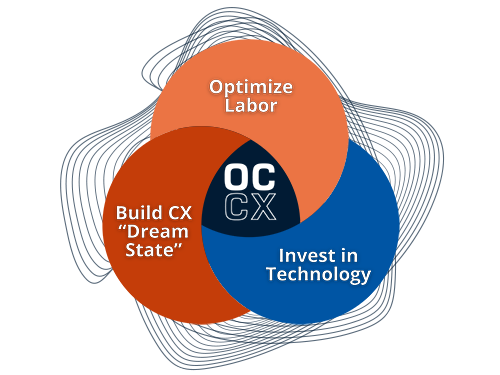Outcome-Centric Experts: Delivering Improved CX within Your Budget
We optimize your contact center budget with intelligent outsourcing, align technology with your business objectives, and help you achieve unparalleled differentiation on your CX Dream Path™.
We Help Solve the Three Biggest CX Roadblocks

No CX Budget?
Your CX budget is already under pressure. There are simply no funds for new CX innovations.
How We Help:
We create an innovation fund within your existing budget through contact center outsourcing optimization. Our access to hidden gem mid-market BPO providers enables both improved CX results and reduced costs. Use the created budget to innovate with AI-powered technology solutions and realize further savings to fund ongoing CX improvements.

CX Budget Is High Risk?
You have the budget, but it has strings attached. Those expectations put you, the project, and ultimately the company in a high-risk position.
How We Help:
Internal budgets often come with high expectations for quick returns, this is a very risky commitment to make when implementing complex AI solutions. We mitigate the risk by creating a budget through contact center outsourcing optimization. Since the budget is generated within the current spend, you eliminate the time pressure to show ROI, providing you with an expectation-free budget. This allows you to focus on improving CX rather than rushing to meet expectations for quick results or tight deadlines.

CX Budget, But No Time?
You have access to a budget but lack the time and resources to deploy technology (AI) to ensure your CX strategy’s risk-mitigated deployment.
How We Help:
Outsourcing has been the go-to solution to solve contact center labor issues for decades. The best of those outsourced contact centers (BPOs) have also invested in AI-powered CX technologies to augment their labor solutions. We will align you with the right provider who eliminates the technology learning curve and reduces your organizational risk, allowing you to unlock the AI benefits of improved CX and reduced cost. With the experience, knowledge, and mid-market BPO portfolio, we can deliver the AI-powered outcomes you seek, without waiting for the right time to build it yourself.
Introducing CX Dream Path™: Your Framework for Continuous CX Improvements
 Many CX strategies fail because they treat contact center labor and technology as isolated elements, missing the chance to leverage the full potential of integrated solutions. We help you unlock a clear advantage with your tailored CX Dream Path™ by combining strategic CX labor outsourcing solutions with perfect-fit technology.
Many CX strategies fail because they treat contact center labor and technology as isolated elements, missing the chance to leverage the full potential of integrated solutions. We help you unlock a clear advantage with your tailored CX Dream Path™ by combining strategic CX labor outsourcing solutions with perfect-fit technology.
- Cost-Effective BPO Labor: We start by helping you save money through contact center outsourcing. This allows you to improve CX and spend less.
- Risk Mitigated AI rollout: With the budget created from labor optimization, you have time to make the right technology decisions. With input from our CX experts and our vetted technology partners, you can test use cases, technologies, and strategies to ensure success.
- Building your Dream State CX: The savings from your risk-mitigated AI rollout can fund a team of top-tier agents, supported by AI, to deliver unmatched customer experiences. This strategy applied to your key customers delivers significantly improved performance against your companywide strategic goals.
Our CX Strategy Team
A dedicated team of BPO and CX experts ready to remove the hurdles between you and exceptional CX. We evaluate your goals, pinpoint opportunities within outsourced labor and technology, and guide you to ideal CX outcomes.
![]()
CX Outsourcing Advisor
A contact center veteran dedicated to finding improvement strategies through outsourcing. We have a proprietary database of high-performing mid-market BPO partners that we leverage to help you achieve improved KPI results AND significant savings.
![]()
CX Technology Advisor
A seasoned technologist with outsourcing experience, dedicated to finding improvement strategies through technology. This individual works closely with the CX Outsourcing Advisor to ensure the best alignment of labor and technology. We have a proprietary database of high-performing technology providers and advisory firms that we leverage to help you reinvest the savings and improvements delivered by outsourcing, resulting in even greater CX improvements and cost reductions.
![]()
CX Success Analyst
An experienced contact center leader from our team of 20+ year CX veterans, responsible for ongoing performance monitoring and CX strategy optimization. They work alongside you and your CX Outsourcing and Technology Advisors, providing ongoing support and recommendations to ensure long-term success and sustained improvements.
FAQs
How does call center outsourcing reduce costs without compromising quality?
We partner with leading mid-market BPO providers to reduce costs by optimizing labor, de-risk with geo-diversification, and improving key KPI performance. While changing the location of the agents is a big driver of cost reduction, that is only one of many factors.
How do you determine the best technology investments for our CX goals?
Technology is simply the other toolbox (outsourcing is its own toolbox) under the CX Advisory umbrella. Once objectives are set we’ll work with you to determine the blend of tech and labor that optimally achieves your business objectives. Ensuring scalability to cover future needs is also key to enabling the continuous improvement model.
What cost savings can we expect from this strategy?
Many clients see significant cost reductions (as much as 15% staying in the same geography or over 50% by leveraging other countries) through optimized outsourcing. This is usually more than enough to fund your digital transformation. Our experts ensure you reduce costs while improving CX metrics and KPI performance.
What changes do you recommend for improving CX?
Each client has unique needs, and our unbiased, tailored expertise helps unlock the best solutions for you. Typically aligning with the right fit BPO partner(s) in the right locations and leveraging AI-powered technologies that work in tandem with live agents are core to the overall solution.
How can this strategy support long-term business growth?
By optimizing call center labor and tech investments, we improve CX performance while unlocking a budget for Dream State CX initiatives designed to grow revenue and achieve key outcomes.
What kind of support can we expect from your team?
We are in this for the long term. As your CX Advisory partner, we start with a de-risked framework and tailor it to your unique situation. We stay with you through the implementation of each phase and indefinitely as we work with your chosen providers to continuously improve your outcomes.
How do we get started with your CX advisory services?
Book a strategy call with us. We’ll work with you to understand your needs and discuss the potential a tailored CX Dream Path™ holds for you.


